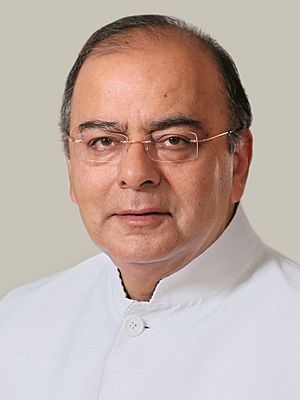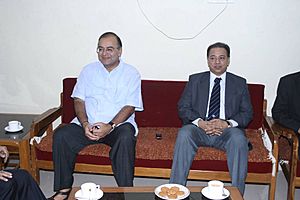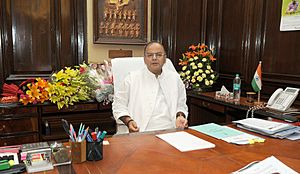Arun Jaitley facts for kids
Quick facts for kids
Arun Jaitley
|
|
|---|---|

Official Portrait, 2014
|
|
| Minister of Finance | |
| In office 26 May 2014 – 30 May 2019 |
|
| Prime Minister | Narendra Modi |
| Preceded by | P. Chidambaram |
| Succeeded by | Nirmala Sitharaman |
| Minister of Corporate Affairs | |
| In office 26 May 2014 – 30 May 2019 |
|
| Prime Minister | Narendra Modi |
| Preceded by | Sachin Pilot |
| Succeeded by | Nirmala Sitharaman |
| Minister of Defence | |
| In office 13 March 2017 – 3 September 2017 |
|
| Prime Minister | Narendra Modi |
| Preceded by | Manohar Parrikar |
| Succeeded by | Nirmala Sitharaman |
| In office 26 May 2014 – 9 November 2014 |
|
| Prime Minister | Narendra Modi |
| Preceded by | A. K. Antony |
| Succeeded by | Manohar Parrikar |
| Minister of Information and Broadcasting | |
| In office 9 November 2014 – 5 July 2016 |
|
| Prime Minister | Narendra Modi |
| Preceded by | Prakash Javadekar |
| Succeeded by | Venkaiah Naidu |
| 26th Leader of the House, Rajya Sabha | |
| In office 26 May 2014 – 11 June 2019 |
|
| Preceded by | Manmohan Singh |
| Succeeded by | Thawar Chand Gehlot |
| Leader of the Opposition, Rajya Sabha | |
| In office 3 June 2009 – 26 May 2014 |
|
| Preceded by | Jaswant Singh |
| Succeeded by | Ghulam Nabi Azad |
| Minister of Law and Justice | |
| In office 29 January 2003 – 22 May 2004 |
|
| Prime Minister | Atal Bihari Vajpayee |
| Preceded by | Jana Krishnamurthi |
| Succeeded by | H. R. Bhardwaj |
| In office 23 July 2000 – 1 July 2002 |
|
| Prime Minister | Atal Bihari Vajpayee |
| Preceded by | Ram Jethmalani |
| Succeeded by | Jana Krishnamurthi |
| Minister of Commerce and Industry | |
| In office 29 January 2003 – 22 May 2004 |
|
| Prime Minister | Atal Bihari Vajpayee |
| Preceded by | Arun Shourie |
| Succeeded by | Kamal Nath |
| Minister of State for Information and Broadcasting | |
| In office 13 October 1999 – 30 September 2000 |
|
| Prime Minister | Atal Bihari Vajpayee |
| Preceded by | Jaipal Reddy |
| Succeeded by | Sushma Swaraj |
| Member of Parliament, Rajya Sabha | |
| In office 3 April 2000 – 24 August 2019 |
|
| Preceded by | Naresh Agrawal |
| Succeeded by | Sudhanshu Trivedi |
| Constituency | Uttar Pradesh |
| Constituency | Gujarat |
| Personal details | |
| Born | 28 December 1952 Delhi, India |
| Died | 24 August 2019 (aged 66) New Delhi, India |
| Political party | Bharatiya Janata Party |
| Spouse |
Sangeeta Jaitley
(m. 1982–2019) |
| Children | 2 |
| Alma mater | Delhi University (B.Com, LLB) |
| Occupation |
|
| Awards | Padma Vibhushan (2020) (posthumously) |
Arun Jaitley (28 December 1952 – 24 August 2019) was an important Indian politician and a skilled lawyer. He was a member of the Bharatiya Janata Party (BJP). From 2014 to 2019, he served as the Minister of Finance and Corporate Affairs for the Indian government.
Before this, Jaitley held many other important roles. He was a minister for Finance, Defence, Corporate Affairs, Commerce and Industry, and Law and Justice under different governments. From 2009 to 2014, he was the Leader of the Opposition in the Rajya Sabha, which is one of India's two houses of Parliament. He was also a top lawyer at the Supreme Court of India.
Arun Jaitley played a big part in bringing in the Goods and Services Tax (GST). This tax system helped unite the country's economy. He also oversaw other major changes, like the demonetisation of certain currency notes. In 2019, he decided not to join the new government due to health reasons. After he passed away, he was given the Padma Vibhushan award in 2020. This is India's second-highest award for civilians.
Contents
Early Life and Student Days
Arun Jaitley was born in Delhi, India, on 28 December 1952. His father was a lawyer, and his mother was a homemaker. He went to St. Xavier's Senior Secondary School in Delhi. Later, he studied commerce at Shri Ram College of Commerce at Delhi University. He then earned his law degree from the Faculty of Law, University of Delhi.
During the 1970s, Jaitley was a well-known student leader at Delhi University. He became the President of the Students Union in 1974. From 1975 to 1977, India had a period called the "Emergency." During this time, some basic rights were put on hold. Arun Jaitley was held for 19 months because of his activism. He was a key leader in a movement against corruption. After being released, he joined the Jan Sangh political party.
In 1977, he became the president of the student wing of the BJP, called the ABVP. He also became the secretary of the BJP's Delhi branch in 1980.
Legal Career Highlights
Arun Jaitley started working as a lawyer in 1977. He practiced in the Supreme Court of India and other courts. In 1990, he was recognized as a "Senior Advocate," which is a special title for experienced lawyers.
In 1989, he was appointed as the Additional Solicitor General of India. This is a high-ranking legal position for the government. He helped with important investigations, including the Bofors scandal. He represented many different clients, including well-known politicians. He also wrote articles about law and current events.
Jaitley even represented big companies like PepsiCo and Coca-Cola in court cases. For example, he represented Pepsi in a case where companies were fined for painting ads on rocks in the Himalayas. Later, he represented Coca-Cola in another case.
After becoming the Leader of the Opposition in 2009, Arun Jaitley stopped practicing law. He focused completely on his political duties.
Political Journey
Arun Jaitley was a member of the national executive committee of the Bharatiya Janata Party (BJP) starting in 1991. Before the 1999 general election, he became the spokesperson for the BJP.
Union Minister for Information and Broadcasting (1999–2000)
In October 1999, when the BJP-led government came to power, he was made the Minister of State for Information and Broadcasting. He also became the Minister of State for Disinvestment. This new ministry was created to sell off parts of government-owned businesses. In July 2000, he also took on the role of Minister of Law, Justice and Company Affairs.
Union Minister of Law and Justice (2000–04)
In November 2000, he became a full Cabinet Minister for Law, Justice and Company Affairs and Shipping. He was the first Minister of Shipping when that ministry was created. He left the Shipping ministry in 2001 and the Law ministry in 2002. He then worked as the General Secretary of the BJP and its national spokesperson. In January 2003, he rejoined the government as the Minister of Commerce & Industry and Law & Justice. After his party lost the election in 2004, Jaitley went back to his legal work.
Leader of the Opposition (2009–14)
On 3 June 2009, he was chosen as the Leader of the Opposition in the Rajya Sabha. He resigned from his role as General Secretary of the BJP to follow the party's rule of "One Man One Post." As the opposition leader, he took part in important debates, like the one on the Women's Reservation Bill. He also supported the anti-corruption movement in 2011.
He helped pass two important changes to India's Constitution. One froze the number of parliamentary seats until 2026. The other penalized politicians who switched parties. Even though he had been in the BJP since 1980, he had never run in a direct election until 2014. He ran for a seat in the Lok Sabha (the other house of Parliament) but lost. However, he was elected to the Rajya Sabha from Gujarat and later from Uttar Pradesh.
Union Finance Minister (2014–19)
On 26 May 2014, Prime Minister Narendra Modi chose Arun Jaitley to be the Minister of Finance, Minister for Corporate Affairs, and Minister of Defence. He was a key figure in Modi's first government.
As Finance Minister, he oversaw major economic changes. One big change was the demonetisation of ₹500 and ₹1000 notes in November 2016. The government said this was to fight corruption and illegal money. He also led the introduction of the Goods and Services Tax (GST). This tax system aimed to simplify taxes across the country.
In May 2019, Arun Jaitley wrote to Prime Minister Modi. He explained that due to his health, he would not be able to take an active role in the new government. This meant he would not be a minister in Modi's second term.
Family Life
Arun Jaitley married Sangeeta Dogra on 24 May 1982. Sangeeta's father was a former finance minister of Jammu and Kashmir. Arun and Sangeeta had two children, a son named Rohan and a daughter named Sonali. Both of his children are also lawyers.
Health and Passing
Arun Jaitley faced several health challenges and had multiple surgeries. His health declined over time. He passed away on 24 August 2019, at the age of 66. His cremation took place at Nigam Bodh Ghat the next day. The Indian Cricket team wore black armbands during a match to show respect after his death.
Lasting Impact
Arun Jaitley left a lasting mark on India. On 12 September 2019, the Feroz Shah Kotla stadium in Delhi was renamed the Arun Jaitley Stadium. This was done to honor him because he had been the president of the Delhi & District Cricket Association (DDCA) and a vice-president of the Board of Control for Cricket in India (BCCI).
On 28 December 2020, a statue of Arun Jaitley was unveiled at the Arun Jaitley Stadium.
See also
 In Spanish: Arun Jaitley para niños
In Spanish: Arun Jaitley para niños
 | Charles R. Drew |
 | Benjamin Banneker |
 | Jane C. Wright |
 | Roger Arliner Young |



